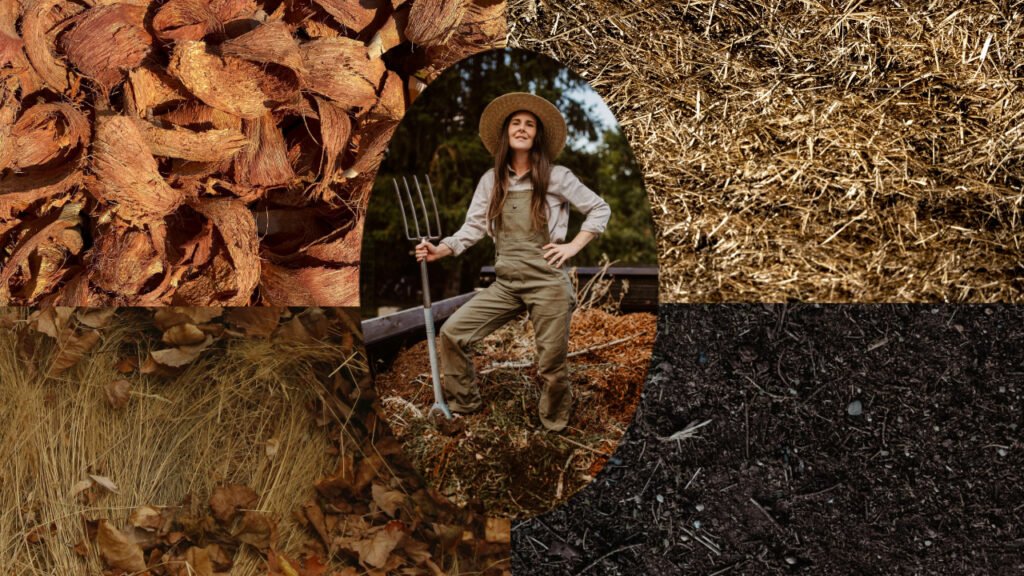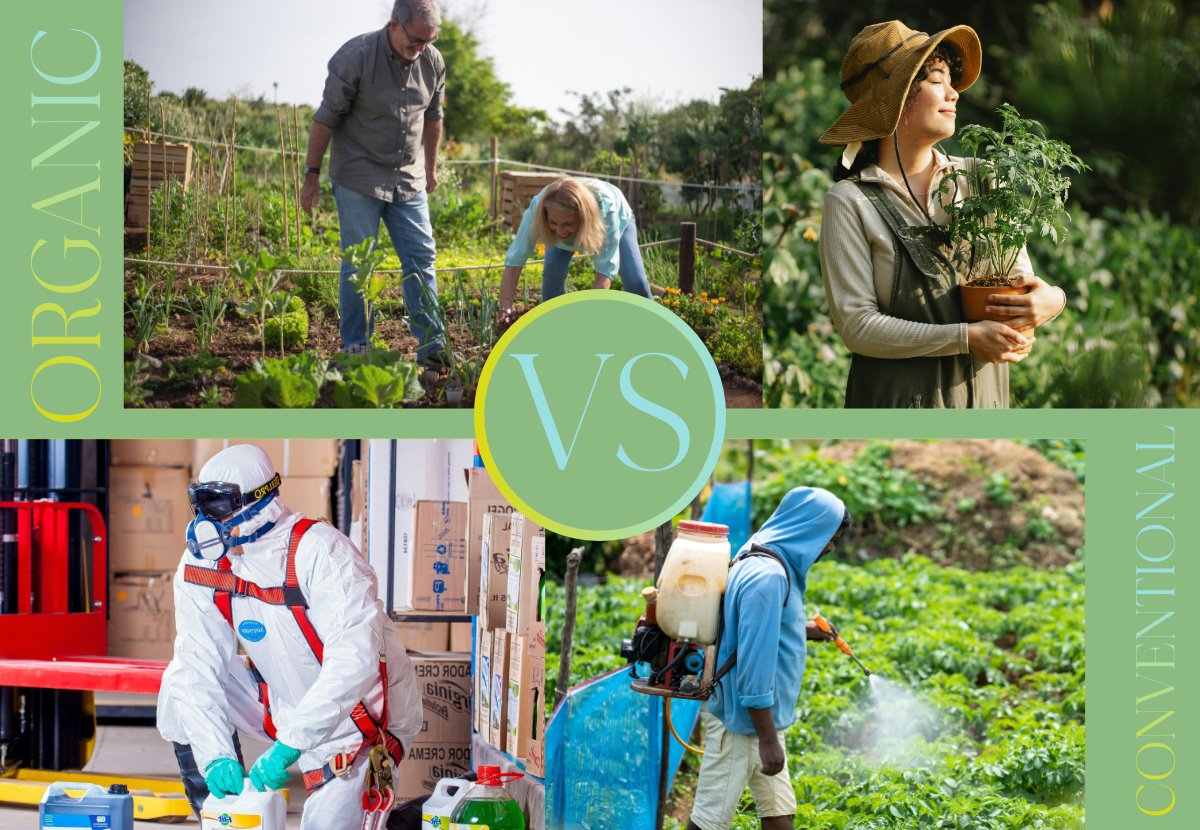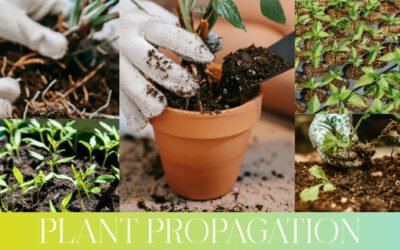Organic gardening and conventional gardening differ primarily in their approaches to soil fertility, pest and disease management, and the use of synthetic chemicals. Here are the key distinctions between the two methods:
1. Approach to Soil Fertility:
Organic Gardening:
Organic gardening focuses primarily on building and maintaining healthy soil using compost, manure, mulches, cover cropping, beneficial organisms and natural amendments.
Organic gardeners use a variety of natural fertilizers such as compost, which enriches the soil with organic matter and beneficial microorganisms, and manure, which provides a balanced mix of nutrients. Additionally, organic mulches, such as straw, grass clippings or shredded bark, help retain moisture and suppress weeds, while organic amendments, like vermicompost or bone meal, improve soil structure and fertility by enhancing its water-holding capacity and nutrient content.

Organic gardening avoids using synthetic fertilizers entirely and replaces them with natural and organic fertilizers.
Conventional Gardening:
Conventional gardening often relies on synthetic fertilizers to provide specific nutrients in readily available forms.
Although synthetic fertilizers can quickly correct soil deficiencies, these practices are harmful to the soil, environment, and human health. For instance, the use of synthetic nitrogen-based fertilizers can lead to nutrient imbalances, soil acidification, and water pollution, posing risks to both the ecosystem and human consumers.
2. Pest and Disease Management:
Organic Gardening:
Organic gardeners use biological pest control methods, such as beneficial insects, beneficial nematodes, and companion planting. Companion planting is the practice of growing different plants together for mutual benefits. For example, planting marigolds alongside tomatoes can repel pests, while growing beans with corn can provide shade and support for the cornstalks. This approach not only reduces the need for synthetic pesticides but also promotes a more balanced and diverse garden ecosystem.
Organic gardening avoids synthetic pesticides and fungicides by using natural alternatives like neem oil, which disrupts the life cycle of many pests; essential oils, which repel insects and inhibit fungal growth; garlic, which acts as a natural insecticide; and various homemade remedies, which can be effective against specific pests or diseases.
Conventional Gardening:
Conventional gardening often uses synthetic pesticides to control pests and chemical fungicides to control fungal diseases.
Although the effect is often achieved quicker and more effectively, it is harmful to beneficial insects and organisms, the soil and human health. Moreover, plants that don’t have a healthy ecosystem to support them are more prone to diseases and pests.
3. Weed Control
Organic Gardening:
Organic gardening uses only natural weed control methods, such as mulching, hoeing, hand weeding, cover cropping and weed smothering.
Mulching consists of covering the soil around plants with a layer of organic materials such as leaves, straw, or shredded bark. This helps to suppress weed growth and retain moisture in the soil.
Hoeing involves using a garden hoe to scrape the soil surface and uproot young weeds.
Hand weeding is a well-known yet effective organic method where weeds are simply pulled out by hand.
Cover cropping is the use of cover crops such as clover, rye, daikon, buckwheat, etc, usually after the harvest to suppress weeds and eliminate erosion. In addition, it serves as an excellent organic fertilizer.
Finally, weed smothering involves the use of materials such as cardboard, newspaper, or plastic sheeting to cover the soil and prevent sunlight from reaching the weeds. This causes the weeds to die off, and the organic materials can then be removed and used as mulch. The decomposing weeds improve and fertilize the soil.
These natural methods of weed control are safe, effective, and environmentally friendly, making organic gardening a sustainable and healthy way to grow plants.
Conventional Gardening:
Conventional gardening, unfortunately, often resorts to the use of synthetic herbicides to combat weeds. This practice, while seemingly effective, poses significant threats to soil health, human well-being, and the delicate balance of our environment. Synthetic herbicides can persist in the soil, affecting its fertility and the health of beneficial organisms. Moreover, their residues can contaminate water sources, leading to potential health risks for humans and wildlife. It’s a stark reminder of the urgent need to shift towards more sustainable, organic practices.
4. Genetically Modified Organisms (GMOs):
Organic Gardening:
Organic gardening completely avoids using genetically modified organisms (GMOs) in seeds or plant materials. GMOs are organisms whose genetic material has been altered in a way that does not occur naturally, often to introduce traits such as resistance to pests or tolerance to herbicides. By avoiding GMOs, organic gardening maintains the integrity of natural plant genetics and promotes biodiversity.
Conventional Gardening:
Some conventional gardening practices involve the use of genetically modified seeds, but it is mostly in large-scale agriculture.
5. Philosophy and Approach:
Organic Gardening:
The main idea of organic gardening is complete avoidance of anything that can cause harm to human health and the environment. It uses a holistic approach by considering the garden as an ecosystem where plants, soil, and organisms interact in a harmonious and beneficial way. This approach aims to promote biodiversity, enhance soil health, and reduce reliance on external inputs.
Conventional Gardening:
Conventional gardening is mainly about efficiency and high productivity. It uses technological and chemical inputs, such as synthetic fertilizers and pesticides, to achieve desired results. The focus is often on maximizing yields and minimizing labor, with less emphasis on long-term sustainability or environmental impact.
From my experience :
From my extensive experience, I can confidently say that organic gardening consistently outperforms conventional methods in the long run. Even when I started with less-than-ideal soil conditions, using organic practices and nourishing the soil with organic matter, such as compost and mulch, I was able to enhance the fertility and structure of the soil. This, in turn, improved water retention and nutrient availability for plants, leading to healthier and more resilient growth. The rewards of patience and perseverance are abundant harvests and a thriving garden ecosystem. Unlike conventional gardening, which leads to soil degradation, organic gardening improves the soil overtime,
When you start a garden with poor soil, it may take time to build fertility. However, you can have abundant harvests from the beginning with the right approach. For example, if you have an ample supply of good-quality compost or manure, you are almost guaranteed to have great results right away. However, to maintain soil fertility and build it further, you must keep adding organic materials to feed soil organisms.
I would recommend everyone who wants to grow healthy, abundant, nutrient-dense produce consider implementing organic practices in their garden.
If you want to check if the product is approved for organic growing, you can use the search function on OMRI website – https://www.omri.org/omri-search

